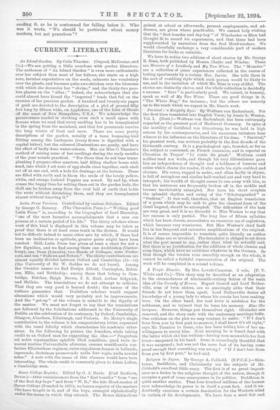Latin Prose Versions. Contributed by various Scholars. Edited by George
G. Ramsay. (The Clarendon Press.)—" Writing good Latin Prose" is, according to the biographer of Lord Macaulay, "ono of the most lucrative accomplishments that a man can possess at a certain period of his life." The thirty scholars whose work of this kind is displayed in this volume may be taken as proof that there is at least some truth in the dictum. It would not be difficult indeed to name other arts by which, if there had been an inclination or aptitude, greater gains might have been reached. Still, Latin Prose has given at least a start for not a few dignities, and we find among them one Archbishop (Canter- bury), one Dean (Lincoln), two Heads of Colleges, nine Profes- sors, and ten " Fellows and Tutors." The thirty contributions are almost equally divided between Oxford and Cambridge (16-14) (the University of Sir W. Geddes we do not know). Among the Oxonian names we find Evelyn Abbott, Carrington, Robin- son, Ellis, and Nettleship ; among those that belong to Cam- bridge, Butcher, Haigh Brown, J. S. Reid, Arthur Sidgwick, and Shilleto. The translations we do not attempt to criticise. That they are very good is beyond doubt ; the names of the authors guarantee that. Doubtless scholars would suggest alterations which would very probably not be improvements. And the "get-up" of the volume is suitable to the dignity of the matter. We must not forget to say that the translations are followed by the felicitations addressed to the University of Dublin on the celebration of its centenary, by Oxford, Cambridge, Glasgow, Aberdeen, Edinburgh, and Victoria. Dr. Merry's single contribution to the volume is his congratulatory letter, expressed with the usual felicity which characterises his academic utter- ances. In the following he praises the founders, while taking credit to an Oxford man for suggesting the idea :—" Pergratum est nobis reputantibus optabile illud consilium, quod tecte nuerat nostrae Universitatis alumnus, summa munificentia con- fecisse Elizabetham reginam, cuius singularem famam in bellando, inperando, doctrinam promovendo nulla fere regio, nulla nesciat aetas." A note with the name of this alumnus would have been interesting. The whole credit is commonly given to Adam Loftus, a Cambridge man.


































 Previous page
Previous page